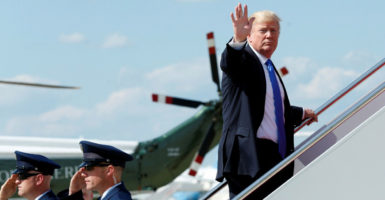President Donald Trump has announced plans to privatize the United State’s air traffic control system, which he said could lead to lower ticket prices.
“We are taking the first important step to clearing the runway for more jobs, lower prices, and much, much, much better transportation,” Trump said last week.
Air traffic control, which monitors and guides aircraft activity, falls under the Federal Aviation Administration’s authority, and is directed by Federal Aviation Administrator Michael Huerta.
Huerta is expected to serve out his full term through January 2018.
There has been no announcement as to who will replace Huerta, according to Michael Sargent, a policy analyst for transportation and infrastructure at The Heritage Foundation.
Trump’s plan to privatize air traffic control would include a board of directors, Sargent said, with “people representing the airlines, the pilots, the airports [and] general aviation.”
The board of directors would also include a CEO and representatives from the government.
Trump said his initiative will help America reclaim its influence in travel.
“America is the nation that pioneered air travel, and with these reforms, we can once again lead the way far into the future. Our nation will move faster, fly higher, and soar proudly toward the next great chapter of American aviation.”
Today, I announced an Air Traffic Control Initiative to take American air travel into the future – finally!
??https://t.co/qSSZLNBpSX pic.twitter.com/CtfqTxF2fp— Donald J. Trump (@realDonaldTrump) June 5, 2017
In a statement outlining his plans, the Trump administration highlighted that privatizing air traffic control will prioritize safety, national security, and access for consumers.
Trump also said that privatization will improve service.
“We’re proposing reduced wait times, increased route efficiency, and far fewer delays,” Trump said. “Our plan will get you where you need to go more quickly, more reliably, more affordably and, yes — for the first time in a long time — on time. We will launch this air travel revolution by modernizing the outdated system of air traffic control. It’s about time.”
Previous transportation secretaries voiced support for Trump’s announcement.
“I applaud President Trump for his leadership in putting forth a bold plan and vision for moving [Air Traffic Control] out of [Federal Aviation Administration] and creating a more efficient and effective Air Traffic Control,” Ray LaHood, who served as transportation secretary from 2009-2013, said in a statement.
James H. Burnley IV, who served as transportation secretary from 1987-1989 under President George H.W. Bush, also praised the announcement.
“Air traffic control is a complex 24 hour a day business,” Burnley said in a statement, adding:
While it is very safe, government red tape increasingly impedes the installation of new technologies. As a result, the U.S. is falling ever further behind other countries, such as Canada, that have separated their systems from government constraints. President Trump’s proposal is the right solution for the 21st century.
Sen. Ted Cruz, R-Texas, also was supportive.
“I think it’s a big deal that the president came out … and is leading on this issue,” Cruz said in a statement, adding:
There are over 130,000 jobs in Texas that depend on the airline and aerospace industries and by modernizing Air Traffic Control we will see an increase in safety, a decrease in waiting times, decreased costs, and improve the environment by having far less emissions. It should be a no-brainer.
Rep. Rick Nolan, D-Minn., voiced concerns about the announcement.
.@POTUS has announced plans to privatize US Air Traffic Control system – a terrible idea that will jeopardize travel safety & efficiency pic.twitter.com/AbUBNPG1Dc
— US Rep. Rick Nolan (@USRepRickNolan) June 5, 2017
Sen. Bill Nelson, D-Fla., is also skeptical. “Why give away billions of dollars in government assets to an entity that will be governed in large part by the airlines,” Nelson said, according to Reuters.
Sen. Ron Wyden, D-Ore., also disapproves.
Our nation’s infrastructure is crumbling & Trump’s offering up air traffic control to the lowest bidder.
— Ron Wyden (@RonWyden) June 5, 2017
Sargent said the announcement shows promise.
“It moves a vital transportation service out of the government, unshackling it from extensive bureaucracy inertia and establishes it as an independent, nongovernmental, non-profit corporation in charge of providing a service,” Sargent said.






























